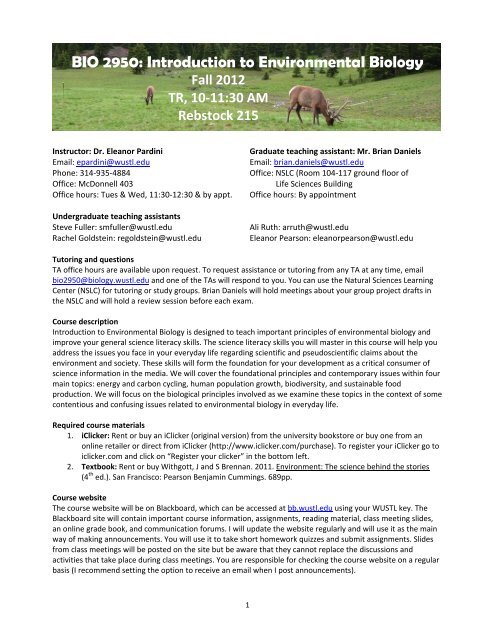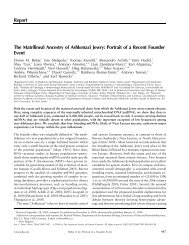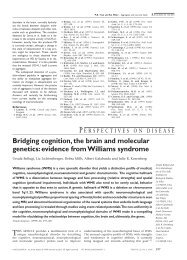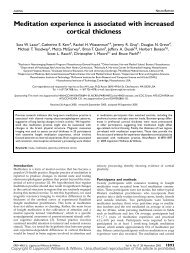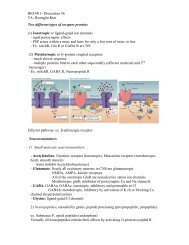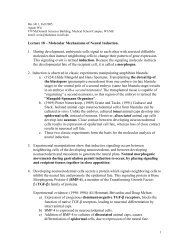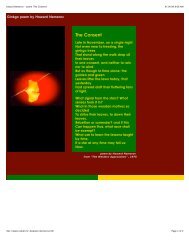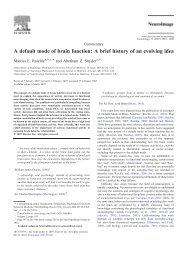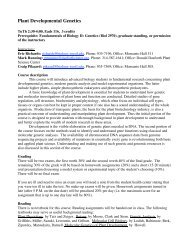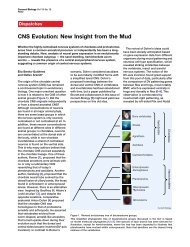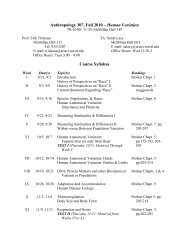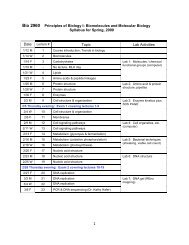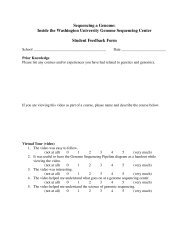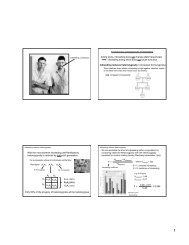BIO 2950: Introduction to Environmental Biology - Natural Sciences ...
BIO 2950: Introduction to Environmental Biology - Natural Sciences ...
BIO 2950: Introduction to Environmental Biology - Natural Sciences ...
Create successful ePaper yourself
Turn your PDF publications into a flip-book with our unique Google optimized e-Paper software.
<strong>BIO</strong> <strong>2950</strong>: <strong>Introduction</strong> <strong>to</strong> <strong>Environmental</strong> <strong>Biology</strong>Fall 2012TR, 10‐11:30 AMRebs<strong>to</strong>ck 215Instruc<strong>to</strong>r: Dr. Eleanor PardiniEmail: epardini@wustl.eduPhone: 314‐935‐4884Office: McDonnell 403Office hours: Tues & Wed, 11:30‐12:30 & by appt.Undergraduate teaching assistantsSteve Fuller: smfuller@wustl.eduRachel Goldstein: regoldstein@wustl.eduGraduate teaching assistant: Mr. Brian DanielsEmail: brian.daniels@wustl.eduOffice: NSLC (Room 104‐117 ground floor ofLife <strong>Sciences</strong> BuildingOffice hours: By appointmentAli Ruth: arruth@wustl.eduEleanor Pearson: eleanorpearson@wustl.eduTu<strong>to</strong>ring and questionsTA office hours are available upon request. To request assistance or tu<strong>to</strong>ring from any TA at any time, emailbio<strong>2950</strong>@biology.wustl.edu and one of the TAs will respond <strong>to</strong> you. You can use the <strong>Natural</strong> <strong>Sciences</strong> LearningCenter (NSLC) for tu<strong>to</strong>ring or study groups. Brian Daniels will hold meetings about your group project drafts inthe NSLC and will hold a review session before each exam.Course description<strong>Introduction</strong> <strong>to</strong> <strong>Environmental</strong> <strong>Biology</strong> is designed <strong>to</strong> teach important principles of environmental biology andimprove your general science literacy skills. The science literacy skills you will master in this course will help youaddress the issues you face in your everyday life regarding scientific and pseudoscientific claims about theenvironment and society. These skills will form the foundation for your development as a critical consumer ofscience information in the media. We will cover the foundational principles and contemporary issues within fourmain <strong>to</strong>pics: energy and carbon cycling, human population growth, biodiversity, and sustainable foodproduction. We will focus on the biological principles involved as we examine these <strong>to</strong>pics in the context of somecontentious and confusing issues related <strong>to</strong> environmental biology in everyday life.Required course materials1. iClicker: Rent or buy an iClicker (original version) from the university books<strong>to</strong>re or buy one from anonline retailer or direct from iClicker (http://www.iclicker.com/purchase). To register your iClicker go <strong>to</strong>iclicker.com and click on “Register your clicker” in the bot<strong>to</strong>m left.2. Textbook: Rent or buy Withgott, J and S Brennan. 2011. Environment: The science behind the s<strong>to</strong>ries(4 th ed.). San Francisco: Pearson Benjamin Cummings. 689pp.Course websiteThe course website will be on Blackboard, which can be accessed at bb.wustl.edu using your WUSTL key. TheBlackboard site will contain important course information, assignments, reading material, class meeting slides,an online grade book, and communication forums. I will update the website regularly and will use it as the mainway of making announcements. You will use it <strong>to</strong> take short homework quizzes and submit assignments. Slidesfrom class meetings will be posted on the site but be aware that they cannot replace the discussions andactivities that take place during class meetings. You are responsible for checking the course website on a regularbasis (I recommend setting the option <strong>to</strong> receive an email when I post announcements).1
will use up one attempt). Your final quiz attempt will be scored. Quizzes are worth just a few pointseach and are due by 9 AM before class <strong>to</strong> earn credit (class starts at 10:10). You can take quizzesafter the deadline for practice but they will not count for credit.40% Group projects: You will work with your permanent group <strong>to</strong> complete two group projectsthroughout the semester. All groups will complete the first project on the same <strong>to</strong>pic. For thesecond project, your group will sign up for a <strong>to</strong>pic of choice. Your group grade for each project isdetermined by your rough draft group grade (10%) and your final draft group grade (90%). Yourfinal individual grade for this component of the course will be the average of your two group gradesmultiplied by your mean group contribution score as determined by the other members of yourgroup using CATME peer evaluations.40% Exams: There will be four exams and your lowest score will be dropped (there are no makeupexams; the drop allows for emergencies or unexcused absences). Your score for each exam isdetermined by your individual exam score (75%) and your group exam score (25%).The following scale will be used <strong>to</strong> assign grades (if you are taking this course Credit/No Credit, you must receivea C‐ or better <strong>to</strong> receive Credit):A+AA‐9793‐9690‐92B+BB‐87‐89%83‐86%80‐82%C+CC‐77‐79%73‐76%70‐72%D+DD‐67‐69%63‐66%60‐62%F 0‐59%Academic integrityThe academic integrity policy of Washing<strong>to</strong>n University in St. Louis states: "Effective learning, teaching andresearch all depend upon the ability of members of the academic community <strong>to</strong> trust one another and <strong>to</strong> trustthe integrity of work that is submitted in classes for academic credit or conducted in the wider arena of scholarlyresearch. When such an atmosphere of mutual trust exists, the free exchange of ideas is fostered, and allmembers of the community are able <strong>to</strong> work <strong>to</strong> achieve their highest potential. In all academic work, it isimportant that the ideas and contributions of others be appropriately acknowledged, and that work that ispresented as original is in fact original. Ensuring the honesty and fairness of the intellectual environment atWashing<strong>to</strong>n University is a responsibility that is shared by faculty, students, and administrative staff."The complete policy and procedures are available at: http://studentconduct.wustl.edu/integrity/policy. As astudent at Washing<strong>to</strong>n University, it is your responsibility <strong>to</strong> become familiar with, understand, and abide by thestandards outlined in this policy before performing any academic work. Ignorance of these policies is not adefense in cases of infringement.Any person found using unauthorized assistance (including plagiarism, submitting work for more than one classwithout obtaining permission from all instruc<strong>to</strong>rs, copying answers from another student during an individualexam, sharing clickers, or turning in group work <strong>to</strong> which you did not contribute) will be forwarded <strong>to</strong> theCommittee for Student Academic Integrity. Students found guilty by the Committee will be given a grade of F forthe course and be referred <strong>to</strong> the Dean for further action.Attendance policyI expect you <strong>to</strong> attend and actively participate in all class meetings. You are responsible for all material coveredin class whether or not you attend. You can earn points for participation by answering clicker questions. Youonly need <strong>to</strong> answer 80% of clicker questions <strong>to</strong> receive maximum participation credit, which allows you wiggleroom for missing occasional classes, illnesses, emergencies, forgetting your clicker, or dead batteries. I will notconsider any excused/unexcused absence issues or technology issues with clickers. If you think your clicker is no<strong>to</strong>perating correctly (and you have already replaced the batteries) contact iClicker or visit the universitybooks<strong>to</strong>re (1 year warranty from iClicker).4
Regrading policyEvery attempt will be made <strong>to</strong> grade fairly, consistently, and accurately. For regular, in‐class exams, if youdisagree with the way your answer on your individual exam was graded, you may submit a written request for aregrade within 72 hours of receipt of your graded exam. To submit a regrade request, follow the instructionsposted on Blackboard. If you submit an exam question for regrading, I reserve the right <strong>to</strong> regrade the entireexam, after which your regraded score will be used in calculations for your final individual grade. Submit yourwritten request <strong>to</strong> my office by the deadline.Help is available!Academic resourcesThe <strong>Natural</strong> <strong>Sciences</strong> Learning Center (http://www.nslc.wustl.edu/) has a computer lab and rooms availablefor study groups. Corners<strong>to</strong>ne offers free academic peer men<strong>to</strong>ring and training in learning skills(http://www.corners<strong>to</strong>ne.wustl.edu/). I also highly recommend the following book as an excellent resourcefor learning skills <strong>to</strong> help you be a successful college learner: Nist, SL and Holschuh, JP (2006) College SuccessStrategies, 2nd ed. Pearson Education, Inc, New York.Disability resourcesStudents who are seeking disability information or support should contact Disability Resources (DRC) at 935‐5970 and access information at (http://www.corners<strong>to</strong>ne.wustl.edu/). If you require specialaccommodations for exams or other course activities, please contact me as soon as possible so that I canarrange for accommodations for you for all in‐class activities and exams.Contacting meI want everyone <strong>to</strong> have a meaningful learning experience and do well in this course. The only way for me <strong>to</strong>know if you are struggling is for you <strong>to</strong> communicate with me. Please feel free <strong>to</strong> email, call me, or <strong>to</strong> s<strong>to</strong>p bymy office hours. I work hard <strong>to</strong> respond <strong>to</strong> student concerns and emails but I am not available at all hours ofthe day and night: allow 48 hours for email responses and do not wait until the last minute (after 5 PM or aweekend) as I will not be able <strong>to</strong> help you. (As a gentle reminder, please strive <strong>to</strong> use proper email etiquette.For example, use clear subject lines, use a salutation <strong>to</strong> open your email, and sign off with your full name,rather than starting out with “Hey” or similarly informal openings and textspeak.)TechnologyI will not consider technology excuses in this course. There are computer labs in Olin Library, the NSLC, andother campus locations. Make sure you back up your work <strong>to</strong> avoid losing data or work if your computercrashes. It is your responsibility <strong>to</strong> make sure you have access <strong>to</strong> Blackboard. You can access Blackboard helpby clicking “Help” at bb.wustl.edu, or by going <strong>to</strong> http://ondemand.blackboard.com/students.htm or bycontacting WU Student Technology Services (http://sts.wustl.edu/).Late workYou will have adequate time <strong>to</strong> complete all of assignments. If you wait until the last minute (
your choosing. To make this process work, every member of the group needs <strong>to</strong> come prepared <strong>to</strong> shareknowledge, solve problems, and work equally.Peer evaluation To ensure equitable group participation and positive group interdependence, yourexam grades will be weighted more heavily by your individual score and the individual grade you earnfor the group project component of the class will include a peer evaluation component. We will use ananonymous online <strong>to</strong>ol (CATME) <strong>to</strong> conduct peer evaluations. You will have the opportunity <strong>to</strong>anonymously rate your group members after the first exam and group project, which gives everyone achance <strong>to</strong> improve. You will also anonymously evaluate all the other members at the end of the course.The peer evaluations will be used <strong>to</strong> determine each student’s final grade for the group projectcomponent of the course. For example, if your group earns 85% and 95% on your two projects, thegroup grade is an average of 90%, which will then be modified by your peer evaluation score (e.g. if youearn a 90% from your group members, your individual project grade is 90% of 90%. I reserve the right<strong>to</strong> overrule the peer evaluation score if it appears that there will be a miscarriage of justice.Donald Trump Clause When you work on a group project, it is inevitable that some team members willcontribute more than others. I expect you <strong>to</strong> work <strong>to</strong>gether <strong>to</strong> collaboratively solve problems, but I amavailable should you need periodic outside help <strong>to</strong> navigate and improve your group dynamics.However, it can become a critical problem if, over time, one person demonstrates a consistent lack ofcommitment <strong>to</strong> the team (i.e., failing <strong>to</strong> attend meetings, not completing his or her portion of the grouptask, or submitting unacceptable work on behalf of the group). In such an instance, I reserve the right <strong>to</strong>"fire" that member. Firing involves a two step process: (1) The team (in consultation with the instruc<strong>to</strong>r)gives the wayward member a warning which includes the wayward teammate negotiating with thegroup how he or she is going <strong>to</strong> be a better teammate. (2) If the member continues <strong>to</strong> behaveinappropriately, that individual will be fired from the group by the instruc<strong>to</strong>r. If your membership withinthe group is terminated, you forfeit all team benefits associated with completing the project as a group.You will complete individual assignments and exams from the point of termination <strong>to</strong> the end of thesemester. Bad teammates usually show their tendencies early, so let a problematic group member knowher/his behavior is not acceptable early.Schedule of <strong>to</strong>pics and due datesSunday Tuesday ThursdayAug 28 In<strong>to</strong> Aug 30 Sci/quant litSep 2 Sep 4 Sci/quant lit Sep 6 Sci/quant litSep 9 Sep 11 Sci/quant lit Sep 13 Carbon/energySep 16 Climate change draft Sep 18 Carbon/energy Sep 20 Carbon/energySep 24 Sep 25 Carbon/energy Sep 27 EXAM 1Sep 30 Climate change final Oct 2 Carbon/energy Oct 4 Human population growthOct 7 Oct 9 Human population growth Oct 11 Human population growthOct 14 Carbon & pops draft Oct 16 Human population growth Oct 18 Human population growthOct 21 Oct 23 Biodiv/conservation Oct 25 EXAM 2Oct 28 Carbon & pops final Oct 30 Biodiv/conservation Nov 1 Biodiv/conservationNov 4 Biodiversity draft Nov 6 Biodiv/conservation Nov 8 Biodiv/conservationNov 11 Nov 13 Biodiv/conservation Nov 15 EXAM 3Nov 18 Biodiv final/food draft Nov 20 Sustainable food Nov 22 ThanksgivingNov 25 Nov 27 Sustainable food Nov 29 Sustainable foodDec 2 Dec 4 Sustainable food Dec 6 Sustainable foodDec 9 Food final Dec 11 Reading day Dec 13 First day final examsDec 16 Dec 18 Exam 4 (1‐3 PM)*Details of this syllabus are subject <strong>to</strong> change. Updates will be announced on Blackboard*6


